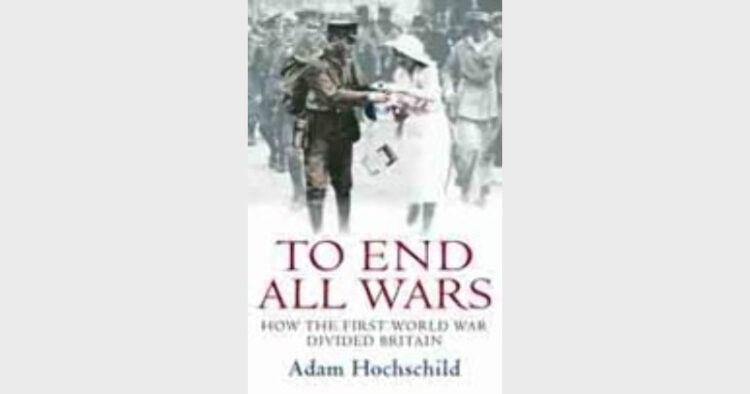A brilliant anti-war treatise
War is not about winning but about lives lost
By Dr R Balashankar
To End All Wars: How the First World War Divided Britain, Adam Hochschild, Macmillan Publishers Limited, Pan Macmillan, Pp 448 (HB), £20.00
Where have all the flowers gone — the song by Pete Seeger evokes the poignancy of loss of young lives in wars. War is a traumatic experience. But no nation wants to back off from one. To End All Wars: How the First World War Divided Britain by Adam Hochschild gives the horrible statistics of the war and the history of anti-war movement.
The narration in fact winds along with the story of the personalities involved in the campaign against war. “Of every 20 British men between 18 and 32 when the war broke out, three were dead and six wounded when it ended… If the British dead alone were to rise up and march 24 hours a day past a given spot, four abreast, it would take them more than two and a half days.” Britain alone lost 722,000 men and another 200,000 from her colonies. Thousands of soldiers from India died in foreign lands, unmourned. Several hundred soldiers have gone missing, till date unaccounted.
But the anti-war campaigners were jeered and ostracized and condemned. Despite the overwhelming number of casualties, the mood in all the nations was jingoistic and an all-out support for war. And unlike the war casualties today, where most victims are from poor background, it was the ruling class that gave soldiers to the army then. “Of all men who graduated from Oxford 1931, 31 percent were killed.”
Some of the prominent anti-war campaigners were James Keir Hardie, the founder of the left movement in Britain, Sylvia Pankhurst, her sister and mother (who later changed their position a neat hundred and eighty degrees) eminent thinkers as Bertrand Russell and Emily Hobhouse, Charlotte Despard and Stephen Hobhouse. The divide the war created was also reflected in the families with parents and siblings taking opposing views. The war was not fought in trenches alone but in the homes of several citizens.
The casualties were high on all sides. The French and the Germans too lost an enormous number of soldiers. It was as though a whole generation was removed from the scene. Hochschild builds a strong case for anti-war sentiments and reminds the readers (of the countries who lost their men) of the generation lost. But then, even people who lost their children to war, like Kipling, never opposed war. In fact even in these modern times, the minute any government declares hostilities, the public rallies behind it in support, since not doing so would tantamount to lack of patriotism, in public perception. That is one of the reasons why anybody who died in war is treated as martyr. No questions asked.
Hochschild’s book is intensively well-researched, going into the human details of war. But it does not make a strong enough case for anti-war. As long as war is romanticised and death in battlefield is considered heroic, governments will find recruits for pushing to the front. Now, war has become part of the political-diplomatic strategy, with the powerful nations sponsoring their armies into other nations to “restore” democracy and “finish” dictators. Hochschild’s is a book on history, not necessarily popular. Hochschild, an author of six books, teaches at the Graduate School of Journalism at the University of California at Berkley.
(Pan Macmillan, 20 New Wharf Road, London N1 9RR)














Comments